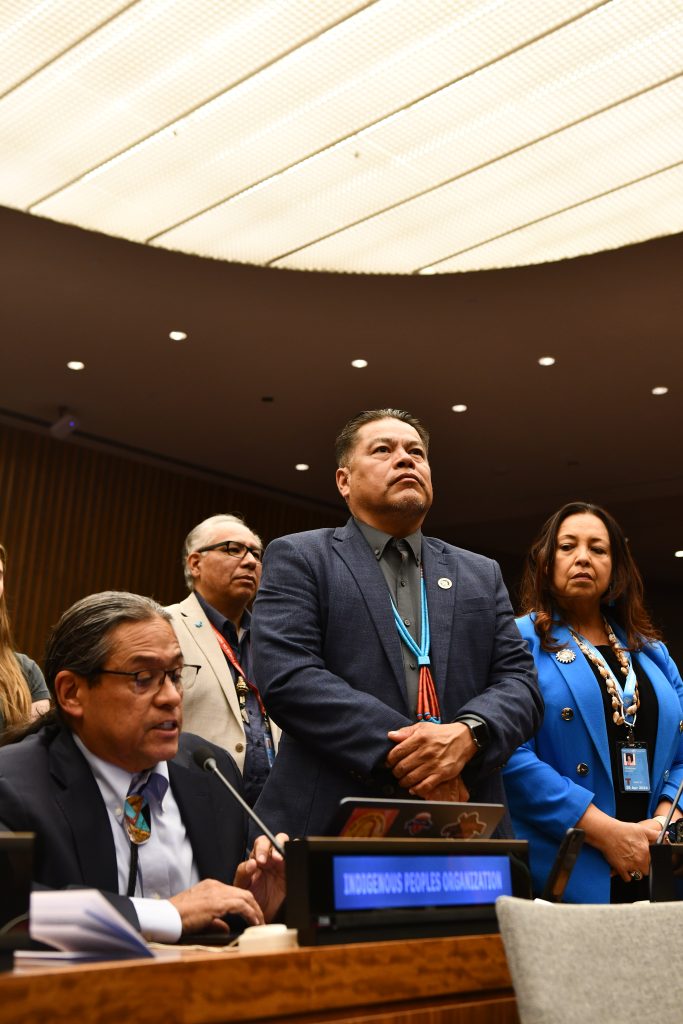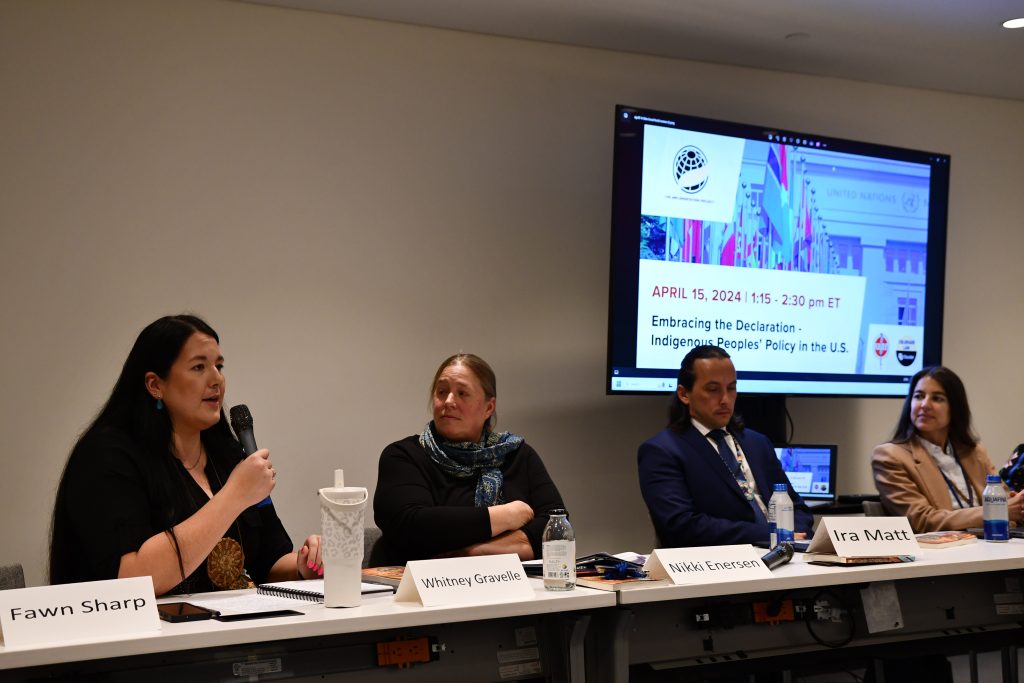The Implementation Project (TIP) attended the 23rd Session of the United Nations Permanent Forum on Indigenous Issues from April 15-26, 2024, supporting more elected U.S. Tribal leaders than ever before. An advanced unedited version of the Permanent Forum’s Report on the 23rd Session reflects interventions by the Bay Mills Indian Community, the National Congress of American Indians (NCAI), and the Coalition of Large Tribes (COLT).
The theme of this year’s session was “Enhancing Indigenous Peoples’ right to self-determination in the context of the United Nations Declaration on the Rights of Indigenous Peoples: emphasizing the voices of Indigenous youth.” Tribal leaders worked throughout the session to ensure U.S. attention to Indigenous Peoples’ issues arising both at home and abroad. Colorado Law Professor and former Special Rapporteur on the Rights of Indigenous Peoples S. James Anaya spoke on the session’s opening panel, delivering remarks about Indigenous knowledge and the right to education as critical elements of Indigenous Peoples’ self-determination.

U.S. Secretary of the Interior Debra Haaland reiterated the United States’ support for the Declaration on the Rights of Indigenous Peoples, and its commitment to co-stewardship agreements between tribal governments and land management agencies, investment in Tribal climate resilience and mitigation, and Interior regulations embracing the safeguard of free, prior, and informed consent (FPIC) in the treatment of ancestral remains and cultural objects. The full text of the statement can be found on the United States Mission to the United Nations website.
NCAI President Mark Macarro gave a powerful statement on the topic of “Enhanced Participation,” calling on the UN to recognize a special status for Tribal Nations commensurate with their right to self-determination. NCAI called for support of Indigenous Peoples’ rights to “Genetic Resources and Associated Traditional Knowledge” during negotiations at the World Intellectual Property Organization and also made an intervention concerning processes associated with the UN Framework Convention on Climate Change.
Speaking on behalf of more than 50 Tribal and First Nation Anishinaabe communities, Bay Mills Indian Community President Whitney Gravelle called for the decommissioning of the Line 5 oil and gas pipeline, which poses a threat to Indigenous Peoples’ human rights throughout the Great Lakes.
COLT Chairman Marvin Weatherwax (Blackfeet Nation) addressed the United States’ failure to protect Tribal communities in violation of its treaty obligations and called on the United States and Canada to comply with domestic laws that require the return of Tribal lands upon which boarding schools were built.
NARF Senior Staff Attorney and TIP Co-Director Sue Noe called on the Forum to identify the progress of States in achieving the aims the Declaration and to make changes to the Annual Session that will allow each Indigenous Peoples’ organization to have at least one chance to address the meeting.

The Implementation Project co-sponsored three side-events at the Forum, focusing on U.S. federal agencies’ implementation of the Declaration; Indigenous Peoples’ self-determination over their lands in the areas of religion, culture, and the economy; and capacity-building programs supporting Indigenous Peoples’ participation in international diplomacy.
NCAI held its third annual Tribal Leaders Reception, welcoming over 150 Tribal leaders, Member State delegates, youth, and Indigenous Peoples’ organizations. The reception featured keynote speeches from President Macarro, past-NCAI President Fawn Sharp, and Colorado Law Dean Lolita Buckner Inniss, who was attending the Forum for the first time.
The 24th session of the Permanent Forum will take place from April 21-May 2, 2025, at the UN Headquarters in New York City with the theme, “The rights of Indigenous Peoples, including those in voluntary isolation and initial contact in the context of the extraction of critical minerals.”
